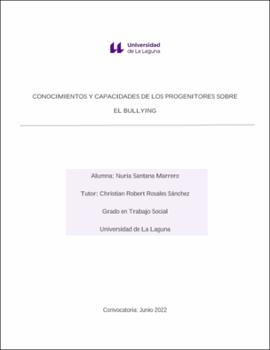Conocimientos y capacidades de los progenitores sobre el bullying.
Date
2022Abstract
En la literatura, los estudios que evalúan los conocimientos de los progenitores sobre el
bullying y sus estrategias de afrontamiento son escasos. En concreto, estos trabajos subrayan que
algunos progenitores cuentan con escasos conocimientos sobre este fenómeno, e incluso niegan su
existencia, lo que deriva en usar estrategias de afrontamiento inadecuadas. La presente
investigación evalúa los conocimientos sobre el bullying de 120 progenitores de diferentes centros
educativos de la isla de Tenerife, así, como las estrategias de afrontamiento que éstos emplean
desde un desconocimiento y evitación de la problemática y desde el uso de un modelo educativo
autoritario. Para ello, se desarrolla un cuestionario ad hoc compuesto por cuatro apartados, donde
el primero evalúa el nivel global de conocimientos sobre el bullying, y los tres restantes valoran la
frecuencia con la que los progenitores adoptan cada tipo de estrategias de afrontamiento. Los
resultados muestran que los progenitores cuentan con unos adecuados conocimientos sobre el
bullying, sin embargo, algunos desconocen aspectos relevantes del tema y emplean estrategias
desde la evitación y el desconocimiento. A su vez, se observa, por un lado, que el nivel de estudios
del progenitor/a influye en los conocimientos que estos/as presentan sobre el bullying y, por otro
lado, que la situación laboral se relaciona con el empleo de estrategias desde el desconocimiento.
De igual manera, ser notificado por problemas de comportamiento de su hijo/a desde el centro
educativo se relaciona con el empleo de estrategias de afrontamiento desde un modelo educativo
autoritario. There is scarce literature regarding the parents' knowledge about bullying as the coping
strategies that they use. The studies show that some parents have a little knowledge about the
phenomenon and even deny its existence, which in turn it results in the use of ineffective coping
strategies to confront it. For this reason, the current investigation aims to assess the knowledge
about bullying of 120 parents from different educational centers on the Tenerife island, such as the
coping strategies that they use. Particularly, it analyses the coping strategies which are employed
from a lack of knowledge and from an avoidance of the problem as those that are used from an
authoritarian educational model. For this, an ad hoc Questionnaire is developed, which is
composed of four sections, the first one evaluates the overall level of knowledge that they have
about the problem, and the last ones are aimed to evaluate the levels of frequency that parents
adopt each one of the strategies mentioned before. As results, it is evident that parents have an
adequate knowledge about bullying, however, some of them ignore relevant aspects of the issue
and employ coping strategies from the avoidance and ignorance. At the same time, it is observed
that the educational level of parents influences the knowledge that they have about bullying, as
their employment situation is related to the use of avoidance strategies. Similarly, being reported
for your children’s behavioural problems by the school is related to the use of coping strategies
from an authoritarian educational model.





